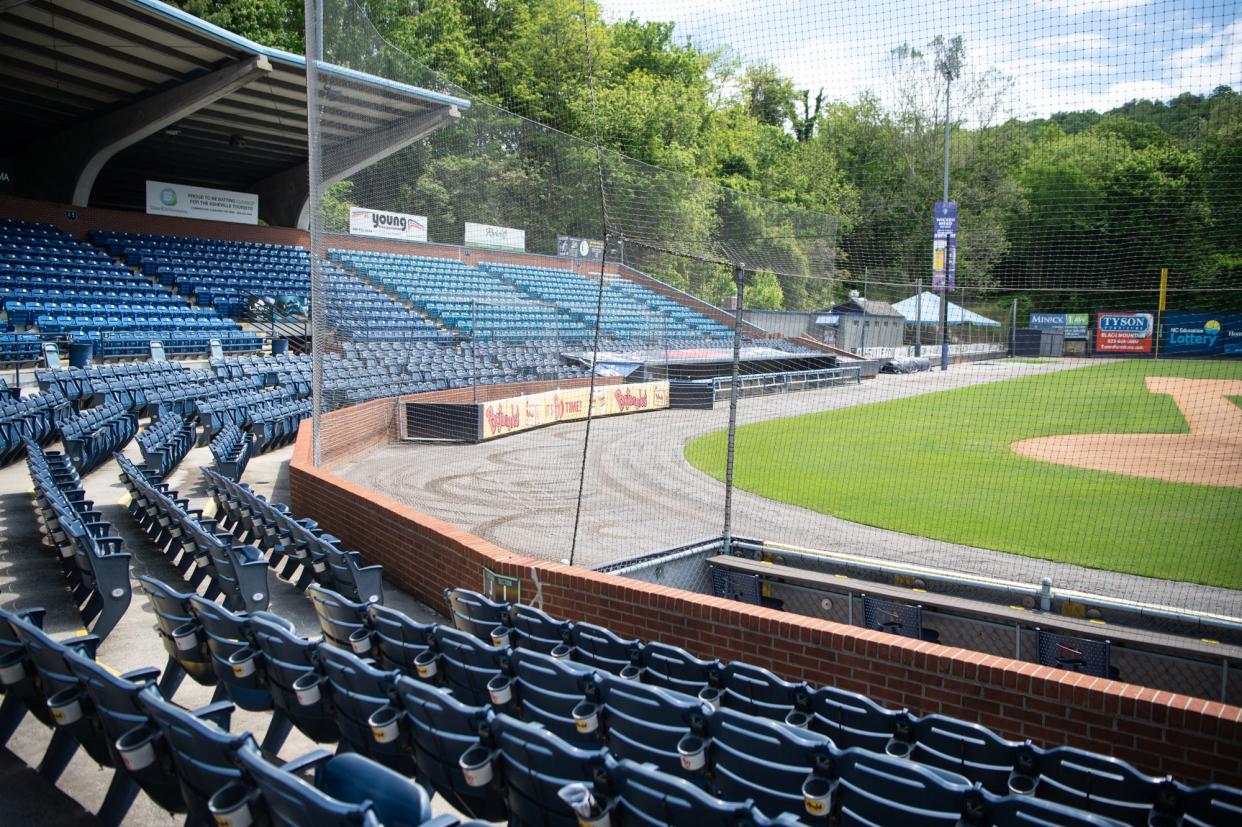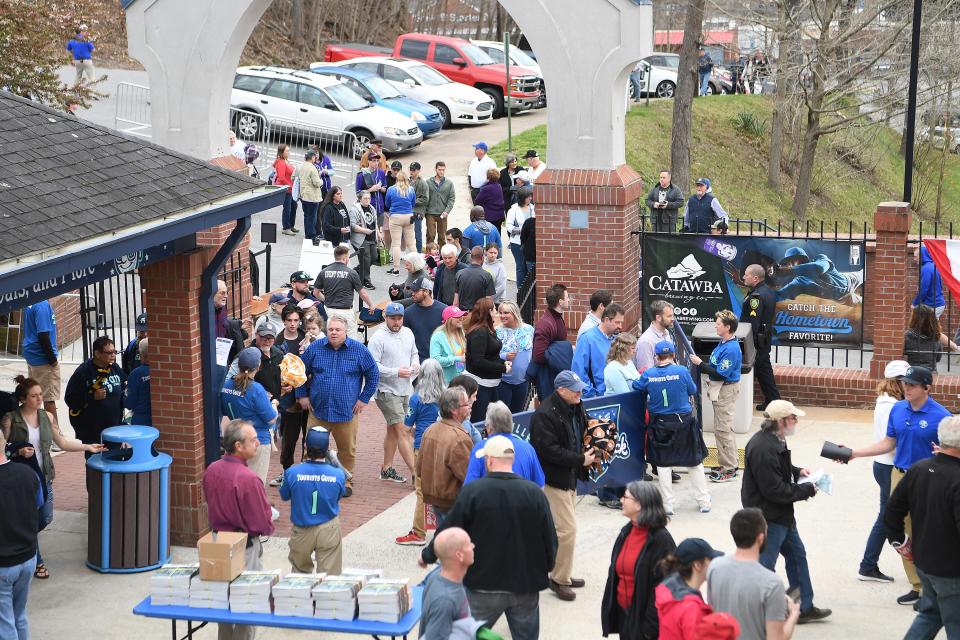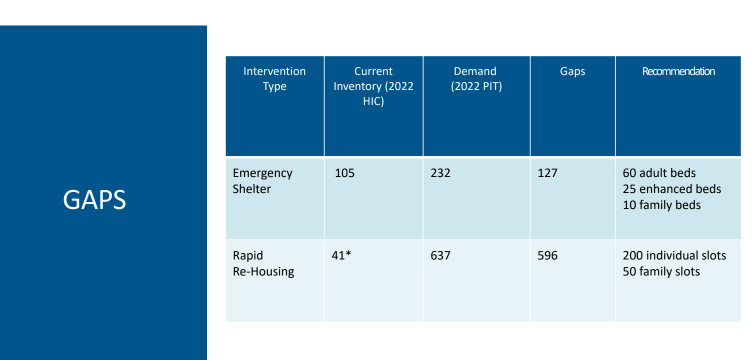Asheville council briefing: Homelessness update. Plus, will McCormick vote be delayed?

ASHEVILLE - At its second public agenda briefing, council members discussed some of their biggest ongoing issues, including the fate of baseball at McCormick Field. As the April 1 deadline to submit a funding plan looms, key county and city votes are on the horizon.
The March 9 meeting also included a review of the upcoming March 14 City Council agenda, council committee updates and more. Of the seven council members, five were in attendance — a point that was noted, along with some discussion on if the time/day of the biweekly meetings should be changed.
More:1st Asheville council agenda briefing: Biltmore Ave. garage 2-week closure, water update
What's next for McCormick Field?
Without a funding plan in place by April 1, this will likely be the last season for Asheville Tourists baseball at city-owned McCormick Field.
On its March 14 agenda, council is scheduled to vote on whether to authorize City Manager Debra Campbell to sign a funding letter of commitment to Major League Baseball regarding needed improvements and long-term investments for McCormick Field, with a potential plan that would obligate the city to allot $950,000 annually for 20 years.
But with Vice Mayor Sandra Kilgore unable to attend the coming City Council meeting, there were talks of delaying the vote until March 28, which would put the decision precariously close to the end-of-month deadline.
After the meeting, Chris Corl, the city's director of Community and Regional Entertainment Facilities, said it wasn't certain whether the vote would be pushed, but expected to learn more at the 3 p.m. budget work session on March 14 preceding the 5 p.m. City Council meeting.
Previous coverage:Asheville considers future of McCormick Field; could mean $950K-$1M annual city commitment
Buncombe County Board of Commissioners are scheduled to vote on whether to commit to the project, and if so, for how much, at its March 21 meeting.
The impending deadline is the result of new requirements by Major League Baseball, which is calling the shots on facility upgrades for 120 affiliated minor league ballclubs nationwide. MLB says upgrades are supposed to be done by Opening Day 2023, but Tourists owner Brian DeWine has acknowledged that isn't happening.
In a November interview, DeWine said they have already applied for a deferral with the MLB since they will not be ready by this season. Approval is contingent on having a funding plan in place by April 1.
The leading option would do more than "save baseball" and would also include plans to expand the use of the stadium, transforming it into a regional multiuse facility that could eventually generate revenue for the city, estimated at upward of $500,000 annually.
Numbers presented by staff estimate both a minimum and full project cost. The MLB mandates alone are $19.6 million. For the minimum project cost in its entirety, the project totals $29.2 million and $37.5 million in full.
After an extensive staff presentation and conversation Feb. 14, council members asked for more input from the surrounding community.
McCormick Field sits at the south end of downtown, beside Memorial Stadium, amid the residential homes that make up East End/Valley Street, one of Asheville’s oldest historically Black neighborhoods.
More:Buncombe Board of Adjustment OKs 136 Charlotte Hwy apartments, STRs: What to know
More:By the numbers: Buncombe County-owned sites considered for 430 affordable units

At the March 9 briefing, Corl said after speaking with Oakhurst and East End neighborhood representatives, "generally, what I think we heard, was that both neighborhoods are on board with the project as presented as a multiuse facility, with additional events such as concerts and other passive events."
He said the city heard a desire for no additional fireworks, and the team agreed to remove requests for more shows from their proposal.
"Part of why we're having what feels like an emergency conversation for a lot of public dollars is because we haven't had continual, real, necessary investments in our assets," said council member Maggie Ullman.
"So I know it feels hard to look forward ... but what this is saying is by taking those steps, we're not going to put ourselves in this position again."
Homelessness update
Also at the March 9 meeting, Emily Ball, the city's homeless strategy division manager, offered an update on the work of the Homeless Initiative Advisory Committee, the lead governing body of the Asheville-Buncombe County Continuum of Care.
After a January report from the Washington, D.C.-based National Alliance to End Homelessness, which offered a roadmap to reducing unsheltered homelessness by 50% in two years, the committee began considering several key recommendations.

More:With a $73K plan to end unsheltered homelessness, what comes next for Asheville?
To guide the effort, committee members formed four work groups — governance, outreach/encampments, shelter and coordinated entry — and Ball offered updates on each group March 9, which were first presented that morning at the HIAC meeting.
Each work group is chaired by a committee member but also includes people with lived experience, members of the Asheville-Buncombe Homeless Coalition, representatives from the Coalition of Asheville Neighborhoods and county and city staff.
Governance: This work group is tasked with improving the Continuum of Care system governance, namely to prepare a new governing charter and move the board out from under the city or county into a community-based model. Ball said they are considering charters recommended by the Alliance, namely examples from Spokane, Washington; San Diego, California; and Houston, Texas. She anticipated a draft charter to be presented to the full committee June.
Outreach/Encampments: Ball said the group has two distinct charges. One, to "build out" the community's outreach capacity, better coordinate the work and ensure it's housing focused. The second is to develop an encampment response strategy and policy that is "clear and transparent," so people can understand how decisions are made, who is involved in the response and what the response looks like.
Shelter: Focused on the alliance recommendation to expand Asheville's shelter capacity by 95 beds, Ball said a key piece of the conversation is differentiating between "program beds" versus "shelter beds."
"Right now, they are focused on learning about how shelters are operating in our community, so doing some site visits there, and then we'll look at how to maximize the utility of shelters that we currently have ... and beyond that, do we need to develop new physical shelter capacity?" Ball asked.
Program beds are those for participants who meet the criteria and agree to participate in certain requirements or programming. On the other hand, shelter beds are typically high-access, low barrier, where walk-ins are able to find respite.
More:Fact checking the Asheville busing myth: Are homeless people being bused into the city?
Both Mayor Esther Manheimer and Commissioner Jasmine Beach-Ferrara are members of the work group. At the March 9 briefing, Manheimer noted it was "evident" that for populations apart from veterans or female victims of domestic violence, outside of any Code Purple emergency shelter beds only triggered when temperatures drop below 32 degrees, "there is not immediate shelter available for you."
Coordinated Entry: Tasked with looking at how people access services in Asheville, particularly focused on how people get into housing programs.
"The idea of coordinated entry is that we're pooling all of folks that need housing, and we're pooling all of our housing resources, and we are making a clear and strategic match that gets the right resources to the person at the right time," Ball said.
Recommendations will come out of the work groups to the full committee and, when necessary, on to council, in the coming months.
Sarah Honosky is the city government reporter for the Asheville Citizen Times, part of the USA TODAY Network. News Tips? Email shonosky@citizentimes.com or message on Twitter at @slhonosky. Please help support this type of journalism with a subscription to the Citizen Times.
This article originally appeared on Asheville Citizen Times: Asheville council briefing: What's on the agenda next week?

